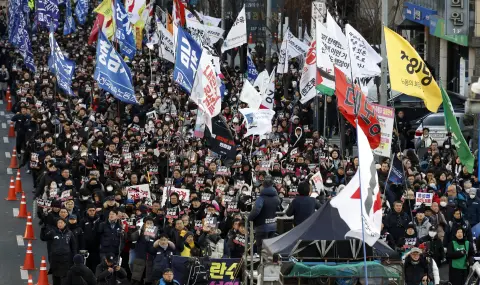A South Korean court issued a new arrest warrant today for ousted president Yun Suk-yeol, Agence France-Presse reported, BTA reported.
Judicial authorities are trying for the second time to detain the head of state, who has been removed from office and is hiding in his residence with his bodyguards, AFP notes.
Yun Suk-yeol became the subject of an arrest warrant after trying to impose martial law in South Korea - a move for which he was removed from the presidency.
Last week, investigators tried to enter the residence of the ousted head of state to detain him, but were confronted by about 200 soldiers and agents from the Presidential Security Service. Investigators were never allowed into the residence and were unable to detain Yoon Suk-yeol.
South Korea's anti-corruption agency and police have vowed to make more determined efforts to detain Yoon, which could prove to be a complicated process, the Associated Press notes.
The anti-corruption agency, which is leading a joint investigation with the police and military, is considering filing charges of inciting rebellion after Yoon declared martial law on Dec. 3, 2024, and sent troops to surround parliament. The parliament subsequently voted to impeach and remove Yun Suk-yeol from office.
Meanwhile, South Korea's Constitutional Court has begun deliberations on whether to formally remove Yun from office or reinstate him.
Over the weekend, members of the presidential guard were seen installing barbed wire near the gate and on the hills leading to the presidential compound.
The anti-corruption agency is also discussing with the police whether to arrest members of the presidential guard staff if they forcibly obstruct efforts to detain Yun.
If investigators are able to detain Yun, they will likely seek court authorization to make a formal arrest. Otherwise, he will be released in 48 hours.
Yoon's lawyers argue that the arrest and search warrants for the president cannot be executed at his residence because of a law that protects places potentially related to military secrets from being searched without the consent of the person responsible - which would be the ousted president. They also argue that the anti-corruption agency lacks the legal authority to investigate allegations of sedition and to delegate the police to detain Yoon.
